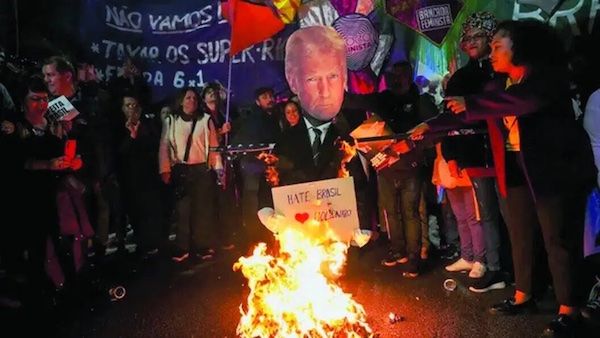U.S. President Donald Trump is threatening to impose a new 50% tariff on all Brazilian products starting on Aug. 1. According to a July 17 New York Times Op Ed, Trump sent a bellicose letter to Brazilian President Luiz Inácio Lula da Silva declaring that the tariff is retaliation for the criminal prosecution of ultra right-wing former president Jair Bolsonaro, who attempted to hold onto power after losing the 2022 election.
New York Times Opinion Editor Lydia Polgreen writes that a much more consequential document had been signed just days earlier. Brazilian and Chinese companies have signed an agreement to begin building a roughly 2,800-mile railroad line that would connect Brazil’s Atlantic coast to a Chinese-built deepwater port on Peru’s Pacific coast.
Such phenomenal infrastructure could transform much of South America’s economy. It would facilitate the distribution of goods and enable greater mobility of people between Latin America and Asia.
‘America First’ and Panama Canal
Shipping problems caused by the U.S. domination of the Panama Canal would be significantly eased. As part of Trump’s bullying “America First” program, BlackRock (the largest U.S. shadow bank) purchased two key Panama Canal ports, Balboa and Cristóbal, located at both ends of the canal. Another issue is the logistics of the waterway passage, which opened in 1914. It was designed before the era of mega-container ships and supertankers.
Polgreen says about the difference between the threat of U.S. tariffs and China’s agreement:
It was a neat illustration of the contrasting approaches China and the United States have taken to their growing rivalry. China offers countries help building a new rail line; Trump bullies them and meddles in their politics.
Brazil, a huge country, bigger than the contiguous U.S., has a growing population, the seventh largest population in the world, and it has enormous resources. It looks forward to a role in building a world economy free from U.S. economic and military domination. To that end, Brazil, along with China, was a founding member of the BRICS, an intergovernmental organization that is currently comprised of ten countries, including Russia and Iran. In July, Brazil hosted the BRICS summit meeting.
Brazil’s collaboration with China has been flourishing. President Lula traveled to Beijing in May for his third bilateral meeting with China’s president, Xi Jinping, since returning to the presidency in 2023, declaring that “our relationship with China will be indestructible.”

